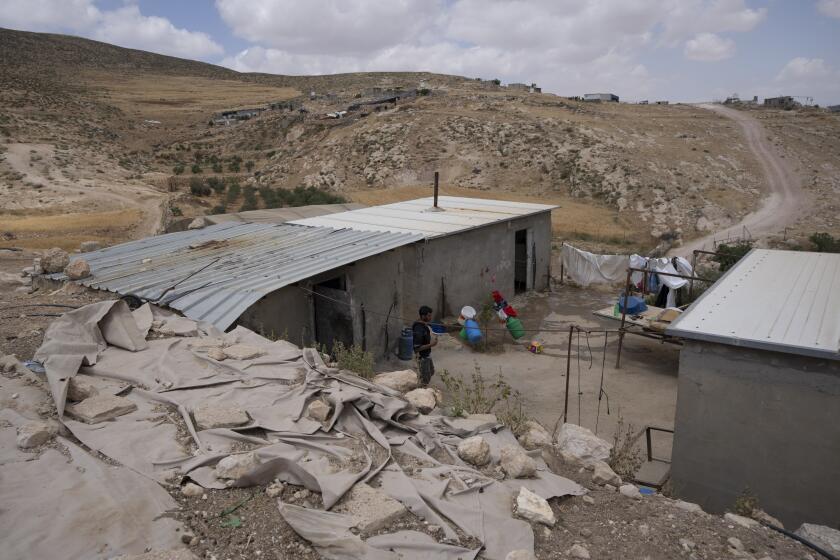High-level U.S. diplomatic mission to Middle East overshadowed by violence

- Share via
WASHINGTON — America’s top diplomat headed out on a trip to Egypt, Israel and the West Bank on Saturday as a spiral of deadly violence gripped the Middle East, with any plans to focus on democracy now overshadowed as the region braces for the no-holds-barred retaliation to Palestinian attacks that the new extremist Israeli government has vowed.
Secretary of State Antony J. Blinken will become the highest-level U.S. official to meet with Israel’s new government, led by perennial Prime Minister Benjamin Netanyahu and populated with far-right nationalists and haredim.
After a month in office, the Netanyahu administration has announced numerous policies that many Israelis say will erode Israel’s democracy and civil rights, and that have alarmed U.S. officials.
The Blinken delegation had hoped to use two days of meetings in Jerusalem to press Netanyahu and other members of his Cabinet on a variety of issues including the normalization or recognition of Israel in the region, rights and freedoms for Palestinians as well as Israelis, and the importance of creating a Palestinian state.
“Normalization — advancing it and deepening it — will be on the agenda,” as will the Biden administration’s “unstinting commitment to a two-state negotiated solution,” U.S. Assistant Secretary of State for Near Eastern Affairs Barbara Leaf said in a briefing ahead of the trip.
But those issues now will take second chair to Blinken’s more pressing mission to urge de-escalation after violence over the last few days in Jerusalem and the West Bank, some of the deadliest in years.
Any serious criticism of the Israeli government’s more drastic proposals will probably be shelved, several analysts predicted.
The wave of violence began Thursday when a raid by Israeli troops on the Jenin refugee camp in the occupied West Bank killed nine, most of whom Israel identified as militants planning a terrorist attack inside Israel. A woman in her 60s was among the dead, Palestinian authorities said.
A day later, as Israeli Jews observed Shabbat on Friday night, a suspected Palestinian gunman opened fire near a synagogue in East Jerusalem, killing seven and wounding several other people before police fatally shot the assailant. Palestinian militant groups praised the attack and celebrations were reported in several Palestinian towns.
In between those two deadly episodes, Palestinian militants fired rockets from the Gaza Strip into Israel, and Israel launched several airstrikes on Palestinian positions. No casualties were reported.
On Saturday, Israeli police said a 13-year-old Palestinian boy shot and wounded an Israeli father and son near Jerusalem’s Old City. Police wounded and captured the assailant.
Given history and the explosive tensions of the moment, the cycle of killing could continue. U.S. officials said they have been on the phone constantly since the Jenin operation with Israeli and Palestinian officials to urge calm.
President Biden telephoned Netanyahu on Friday night to condemn the deadly shooting at the synagogue, which Biden called “an attack against the civilized world.”
In response to the Jenin deaths, the Palestinian Authority, the weakened body that governs the West Bank, announced that it was suspending what has been quietly successful security cooperation with Israel.
“Obviously, we don’t think this is the right step to take at this moment,” Leaf said of the move. “Far from stepping back on security coordination, we believe it’s quite important that the parties retain — and if anything, deepen — security coordination.”
But several members of Netanyahu’s Cabinet have threatened to take an increasingly hard line with Palestinians. Now, the tough rhetoric will be tested as the government faces a genuine security crisis.
Residents and activists say the Israeli military has demolished homes, water tanks and olive orchards in two Palestinian villages in the occupied West Bank.
Itamar Ben-Gvir, convicted in Israel years ago for inciting anti-Arab hate but now a Cabinet minister, has been put in charge of national security. Ben-Gvir once advocated deporting “all Arabs,” but softened his position more recently to say Palestinian “terrorists” should be expelled. He has also proposed changing rules of engagement to make it easier for soldiers and police to open fire on Palestinian demonstrators and more difficult to hold them accountable.
Ben-Gvir’s presence in the Cabinet with such a powerful security role is especially unnerving for Palestinians. U.S. officials have also criticized some of his actions: He attended a recent memorial for his hero Meir Kahane, the slain racist rabbi whose organization was branded a terrorist group by the U.S. Blinken refuses to meet with Ben-Gvir, aides said.
Late Friday, Netanyahu promised “immediate actions” in response to the synagogue shooting.
“We must act with determination and composure,” he said, while urging citizens not to take the law into their own hands.
At the site of the shooting, Ben-Gvir seemed to deliver the opposite message, promising to make it easier to arm civilians.
For the record:
1:15 p.m. Jan. 30, 2023An earlier version of this story referred to the Mideast Institute. Its correct name is the Middle East Institute.
Netanyahu had not wanted to confront the Palestinian issue this early in his tenure because a fierce retaliation risks angering Arab nations that only recently recognized Israel, and who Netanyahu wants to keep on board in the quest for normalization, said Nimrod Goren, a fellow at the Middle East Institute in Washington and head of a think tank in Jerusalem that studies regional politics.
“The region will react to whatever happens with the Palestinians,” Goren said from his home in Israel. “So far they’ve been willing to play along, but if things go badly on the Palestinian tract, they won’t.
“The question is how quickly” they would turn on Israel and its government, he added.
Although the death toll in the region over the last couple of days is striking, the pace of violence — particularly in the West Bank — has been steadily rising for nearly a year.
Following a series of Palestinian attacks, Israel last spring launched a campaign raiding villages across the West Bank in what it said was an effort to eliminate militant cells. About 150 Palestinians were killed last year in the West Bank and East Jerusalem, along with about 30 Israelis, according to local human rights groups that keep track. Before Thursday’s Jenin attack, an average of one Palestinian a day had been killed this year.
Netanyahu’s new government is advocating numerous policies that contravene U.S. goals, including a plan to expand Jewish settlements in the West Bank, which is claimed by Palestinians for a future independent state. The settlements, which many countries consider illegal under international law, have proliferated exponentially to the point that a contiguous Palestinian state may now be impossible.
Netanyahu and his partners are also trying to overhaul the Israeli judiciary so that courts would no longer be able to vet laws, taking away an important checks-and-balances mechanism. Netanyahu’s critics say his aim is to have a criminal corruption case against him voided.
Ultra-Orthodox members of the Cabinet want to inject more religion into education, make it harder for non-Orthodox foreign Jews to obtain Israeli citizenship and have condemned LGBTQ rights. Some Cabinet members, led by Ben-Gvir, want to upset the traditional status quo of religious sites in the Holy City, which are delicately divided among the three Abrahamic faiths: Judaism, Islam and Christianity. Days after taking office, Ben-Gvir made a provocative trip to the Temple Mount, known to Muslims as the Noble Sanctuary, where, under rules in place for years, only Muslims may pray despite the site being sacred to both Muslims and Jews.
“We oppose any unilateral actions that undercut the historic status quo,” State Department spokesman Ned Price said at the time. “They are unacceptable.”
Blinken’s trip to Israel, with a stop in Cairo, follows a visit earlier in the month by national security advisor Jake Sullivan and, reportedly, by CIA Director William Burns at about the same time.
The full-court press reflects concern over the new Israeli government, which some fear could destabilize the region.
More to Read
Sign up for Essential California
The most important California stories and recommendations in your inbox every morning.
You may occasionally receive promotional content from the Los Angeles Times.












